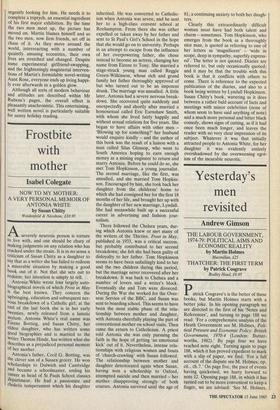Frostbite with mother
Isabel Colegate
NOW TO MY MOTHER: A VERY PERSONAL MEMOIR OF ANTONIA WHITE by Susan Chitty
Weidenfeld de Nicolson, £10.95
I
Aseverely neurotic person is torture to live with, and one should be chary of making judgments on any relation who has cracked under the strain. It is in no sense a criticism of Susan Chitty as a daughter to say that as a writer she has failed to redeem a miserable situation by making a good book out of it. Not that she sets out to redeem; her intention is simply to tell.
Antonia White wrote four largely auto- biographical novels of which Frost in May IS the best known. They concern the Upbringing, education and subsequent ner- vous breakdown of a Catholic girl; at the end of the last book she is in her early twenties, newly released from a lunatic asylum. Antonia White's real name was Eirene Botting, and Susan Chitty, her eldest daughter, who has written some good biographies and is married to the Writer Thomas Hinde, has written what she describes as a prejudiced personal memoir of her mother.
Antonia's father, Cecil G. Botting, was the clever son of a Sussex grocer. He won scholarships to Dulwich and Cambridge and became a schoolmaster, ending his Career as head of St Paula School classics department. He had a passionate and choleric temperament which his daughter
inherited. He was converted to Catholic- ism when Antonia was seven, and he sent her to a high-class convent school at Roehampton. From there she was either expelled or taken away by her father and sent to St Paul's Girl's School in the hope that she would go on to university. Perhaps in an attempt to escape from the influence of her overpowering father, she chose instead to become an actress, changing her name from Eirene to Tony. She married a stage-struck young man called Reggie Green-Wilkinson, whose rich and grand family her father thoroughly approved of but who turned out to be an impotent drunk. The marriage was annulled. A little later, Antonia had a severe nervous break- down. She recovered quite suddenly and unexpectedly and shortly after married a homosexual called Eric Earnshaw Smith, with whom she lived fairly happily and without sexual relations for five years. She began to have affairs with other men — 'Blowing up for something?' her husband would enquire kindly — and the author of this book was the result of a liaison with a man called Silas Glossop, who went to South America hoping to earn enough money as a mining engineer to return and marry Antonia. Before he could do so, she met Tom Hopkinson, a young journalist. The second marriage, like the first, was annulled, and she married Tom Hopkin- son. Encouraged by him, she took back her daughter from the childrens' home to which she had consigned her for the first 18 months of her life, and brought her up with the daughter of her new marriage, Lyndall. She had meanwhile built up a successful career in advertising and fashion jour- nalism.
There followed the Chelsea years, dur- ing which Antonia knew or met many of the writers of the Thirties. Frost in May, published in 1933, was a critical success, but probably contributed to her second breakdown; she felt she had been guilty of disloyalty to her father. Tom Hopkinson seems to have been unfailingly kind to her and the two children during this period, but the marriage never recovered after her breakdown. It was back to Chelsea and a number of lovers and a writer's block. Eventually she and Tom were divorced. During the War she worked for the Over- seas Service of the BBC, and Susan was sent to boarding school. This seems to have been the most stable phase of the rela- tionship between mother and daughter,
with Antonia cheerfully playing the part of conventional mother on school visits. Then came the 'return to Catholicism. A priest told Antonia she was only pursuing the faith in the hope of getting 'an emotional kick' out of it. Nevertheless, intense rela- tionships with religious women and bouts of 'church-crawling' with Susan followed.
The relationship between mother and daughter deteriorated again when Susan, having won a scholarship to Oxford, attempted suicide and then married — her mother disapproving strongly of both courses. Antonia survived until the age of 81, a continuing anxiety to both her daugh- ters.
Clearly this extraordinarily difficult woman must have had both talent and charm — sometimes. Tom Hopkinson, who emerges from the book as a thoroughly nice man, is quoted as referring to one of her letters as 'magnificent' — 'wide in scope, deep in sympathy, superbly express- ed'. The letter is not quoted. Diaries are referred to, but only occasionally quoted; and it may be that the trouble with this book is that it conflicts with others to come. There is reference to the expected publication of the diaries, and also to a book being written by Lyndall Hopkinson. Susan Chitty's book, wavering as it does between a rather bald account of facts and meetings with minor celebrities (none of whom seem to have said anything of note) and a much more personal and bitter black comedy, shows signs of cutting, as if it had once been much longer, and leaves the reader with no very clear impression of its subject. Whatever it was that initially attracted people to Antonia White, for her daughter it was evidently entirely overshadowed by the overweening egot- ism of the incurable neurotic.


















































 Previous page
Previous page